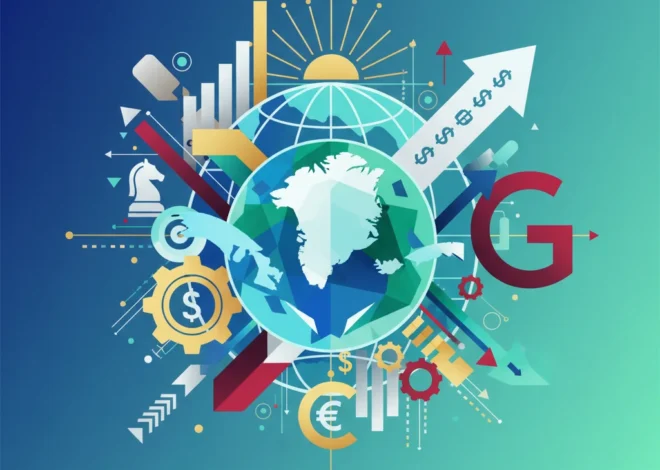
The Trillion-Dollar Handshake: Decoding the New Middle East’s Impact on Global Finance
In the world of global finance, major market shifts are rarely triggered by a single earnings report or a central bank announcement. More often, they are the seismic aftershocks of geopolitical events that fundamentally reshape the landscape of risk and opportunity. We witnessed such a potential inflection point recently, as former U.S. President Donald Trump arrived in Egypt, heralding what he termed a “historic dawn of a new Middle East.” This visit, coming on the heels of a landmark address to the Israeli Knesset and the confirmed release of all remaining living Israeli hostages from Gaza, is far more than a diplomatic headline; it’s a catalyst that could re-price assets, redraw trade routes, and redefine investment strategies for years to come.
For investors, business leaders, and finance professionals, the immediate question is not about the politics, but the portfolio. How does a monumental step towards regional stability translate into actionable economic data? What does this mean for the price of oil, the flow of capital, and the future of financial technology in one of the world’s most critical economic crossroads? This analysis moves beyond the headlines to dissect the profound financial implications of this new era, exploring the cascading effects on the global economy, stock market performance, and the very architecture of international banking and trade.
De-Risking the Desert: The Economic Shockwaves of Stability
The most immediate and palpable impact of reduced regional conflict is on the global energy market. The Middle East, a linchpin of global oil supply, has long been a source of volatility. Any flare-up has historically sent shockwaves through the oil markets, impacting everything from transportation costs to inflation rates worldwide. A credible and lasting peace framework could systematically remove the geopolitical risk premium that keeps oil prices artificially inflated during times of tension.
A more stable supply outlook could lead to lower, more predictable energy costs, providing a significant tailwind for the global economy. For the stock market, this translates into lower input costs for industries like manufacturing, airlines, and logistics, potentially boosting corporate earnings and valuations. Conversely, energy sector investors would need to adjust their models, shifting focus from speculation on supply disruptions to the fundamental economics of production and demand. This new paradigm in energy trading will require a sophisticated understanding of long-term economic trends rather than short-term political gambles.
A New Frontier for Foreign Direct Investment (FDI)
With stability comes confidence, and with confidence comes capital. For decades, immense pools of international capital have viewed the Middle East with apprehension, deterred by political instability despite the region’s vast potential. The announcement of a comprehensive peace, underscored by the release of hostages, acts as a powerful “open for business” sign. We can anticipate a significant uptick in Foreign Direct Investment (FDI) flowing into nations across the region.
The sectors poised to benefit are numerous:
- Infrastructure: New trade corridors, logistics hubs, and transportation networks will be needed to connect previously isolated economies.
- Technology: A burgeoning, youthful population creates a massive market for digital services. We can expect a boom in venture capital for local startups, particularly in fintech and e-commerce.
- Tourism: The opening of borders and the assurance of safety could unlock one of the world’s richest historical and cultural regions for a new wave of global tourism.
This influx of capital will have a multiplier effect on the local economics, creating jobs, boosting consumer spending, and accelerating diversification away from oil dependency—a key long-term goal for many Gulf nations.
Recalibrating the Markets: From Geopolitics to Economics
The financial markets will be the primary arena where this new reality is priced in. The shift will be profound, moving from a market driven by geopolitical headlines to one driven by fundamental economic analysis. Analysts and investors will need to recalibrate their models, focusing on metrics like GDP growth, corporate governance, and regulatory frameworks.
Below is a summary of the potential sectoral impacts, providing a high-level guide for investors navigating this new landscape.
| Sector | Potential Impact & Rationale | Key Investment Areas |
|---|---|---|
| Energy & Commodities | Potential for lower price volatility as geopolitical risk premium diminishes. Focus shifts to operational efficiency and long-term demand. | Trading in futures, energy ETFs, shares in efficient producers, and renewable energy projects. |
| Banking & Finance | Increased demand for trade finance, project financing, and cross-border M&A. Growth in retail banking as regional wealth increases. | Shares in regional banks, private equity focused on financial services, and investment in fintech infrastructure. |
| Technology & Fintech | Explosive growth potential as investment pours in to serve a young, digitally-native population. Cross-border payment systems become critical. | Venture capital, tech-focused ETFs, and companies specializing in blockchain for supply chain and financial technology. |
| Infrastructure & Real Estate | Massive government and private spending on new projects connecting the region. Commercial and residential real estate demand rises. | Infrastructure bonds, construction company stocks, and Real Estate Investment Trusts (REITs). |
The Role of Financial Technology in a New Era
This economic integration cannot happen without a sophisticated financial backbone. This is where financial technology, or fintech, will play a pivotal role. The need for seamless, secure, and efficient cross-border transactions will skyrocket. We can expect to see rapid adoption of new technologies:
- Digital Banking: Platforms that can operate across different regulatory environments will be in high demand.
- Blockchain Technology: For securing complex supply chains, verifying the provenance of goods, and creating transparent trade finance systems, blockchain offers an ideal solution. Its decentralized nature can build trust between parties with a history of mistrust (source).
- Payment Gateways: The proliferation of e-commerce and digital services will necessitate robust payment systems that can handle multiple currencies and local payment methods.
This technological layer is not just a facilitator; it is an investment opportunity in itself. The race to build the financial operating system for the new Middle East will be one of the most compelling stories in the fintech space over the next decade.
Navigating the Path Forward: A Guide for the Astute Investor
While the opportunities are immense, the risks have not vanished—they have merely changed shape. The primary risk shifts from open conflict to the complexities of implementation. Will trade agreements be honored? Will legal frameworks be harmonized to protect foreign investors? Will old rivalries resurface in economic competition?
For investors, this new environment demands a nuanced approach:
- Diversify Regionally: Instead of betting on a single country, consider regional ETFs or funds that provide exposure to a basket of economies set to benefit from increased trade.
- Focus on Enablers: Invest in the “picks and shovels” of this new gold rush. Companies in logistics, financial technology, and communications infrastructure are poised to win regardless of which specific end-market grows fastest.
- Monitor the Politics of Economics: Pay close attention to the formation of new trade blocs, the signing of bilateral investment treaties, and the establishment of joint economic zones. These are the leading indicators of where capital will flow next.
The “historic dawn” that was announced is not a guaranteed sunrise. It is an opportunity—a powerful one—that requires careful navigation. The initial diplomatic breakthrough, including the pivotal release of all hostages as reported, has opened the door (source). Now, the hard work of building a stable and prosperous economic future begins.
Conclusion: From Headline Risk to Economic Opportunity
The arrival of a U.S. envoy in Egypt to cement a new regional peace accord is a watershed moment that transcends politics. It represents a potential structural shift in the global economy, moving one of the world’s most volatile regions from a source of headline risk to a frontier of economic opportunity. For the finance and investment community, this is the time to look beyond the immediate market euphoria and begin the deep, fundamental analysis required to capitalize on this new paradigm. The successful investors of the next decade will be those who understand that peace is not just the absence of conflict, but the presence of opportunity—for growth, for innovation, and for building lasting economic value.


